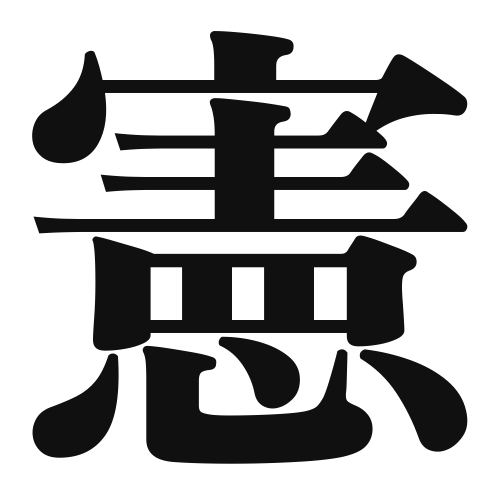1. Overview of Meaning
The kanji “憲” (ken) primarily means “constitution” or “law.” It represents the fundamental principles and rules that govern a state or organization.
2. Formation and Radical
Formation of the Kanji: The kanji “憲” is a compound character (会意文字) that combines elements to convey its meaning. It consists of the radical “心” (kokoro), which means “heart” or “mind,” and the character “建” (ken), which means “to build.” Together, they suggest the idea of building a foundation based on principles and values.
Radical: The radical of “憲” is “心” (kokoro), indicating that it relates to emotions, thoughts, or the mind.
3. Examples of Usage
Common Words and Phrases:
- 憲法 (けんぽう, kenpou) – Constitution
- 憲政 (けんせい, kensei) – Constitutional government
Example Sentences in Daily Conversation:
- 日本の憲法は1947年に施行されました。
(にほんのけんぽうは1947ねんにしこうされました。)
(Japan’s constitution was enacted in 1947.) - 憲政の重要性を理解することが大切です。
(けんせいのじゅうようせいをりかいすることがたいせつです。)
(It is important to understand the significance of constitutional government.)
4. Synonyms and Antonyms
Similar Kanji:
- 法 (ほう, hou) – Law: While “憲” refers specifically to a constitution, “法” is a broader term that encompasses all laws.
Antonyms:
- 無法 (むほう, muhou) – Lawlessness: This term represents the absence of law or order, contrasting with the structured nature of “憲.”
5. Cultural and Historical Background
Relation to Japanese Culture: The concept of “憲” is deeply rooted in Japan’s history, particularly following the Meiji Restoration when modern legal systems were established. The Japanese constitution, known as “日本国憲法” (Nihon-koku Kenpou), is a significant document that outlines the rights and responsibilities of citizens.
Proverbs and Idioms: One common phrase is “憲法の精神” (けんぽうのせいしん, kenpou no seishin), which means “the spirit of the constitution,” emphasizing the importance of upholding constitutional values in society.
